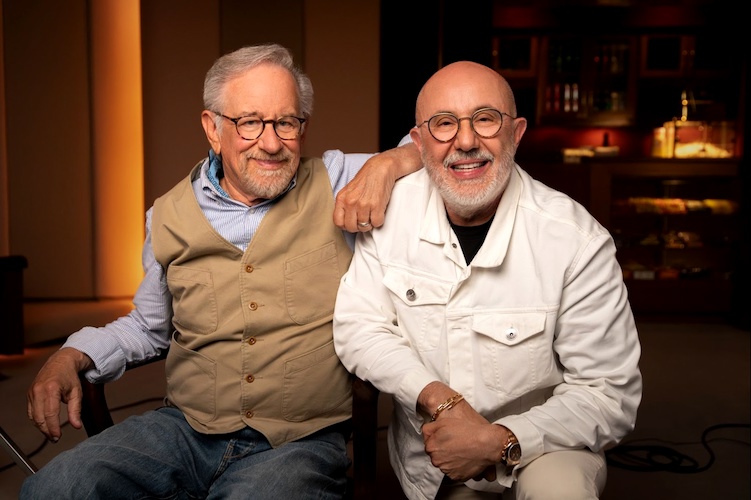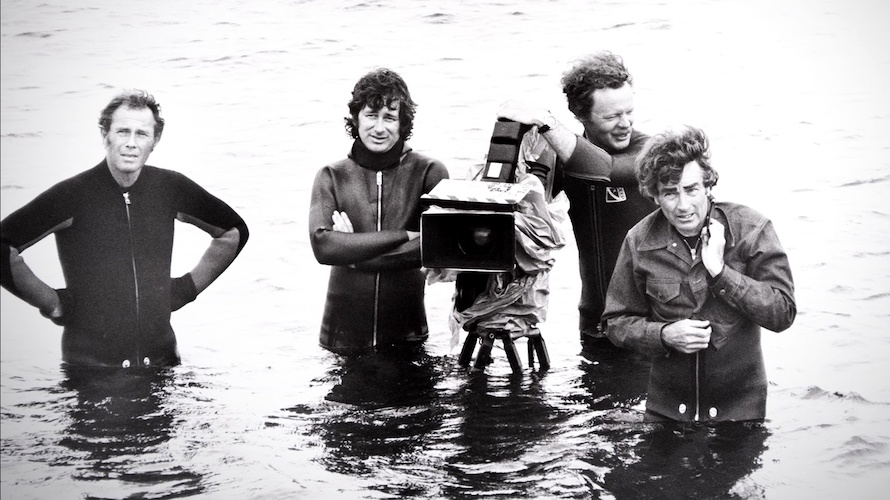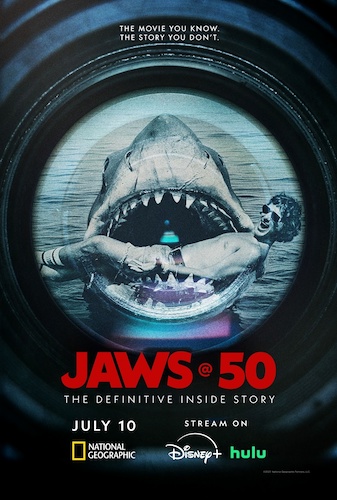Interview: "Jaws @ 50" Director Laurent Bouzereau Discusses His New Documentary About Steven Spielberg's First Blockbuster
With National Geographic’s new documentary Jaws @ 50 coming very soon to Nat Geo, Disney+, and Hulu, I was offered the wonderful opportunity to chat with its director Laurent Bouzereau (Music by John Williams) about the film and his process of assembling it.

Mike Celestino, Laughing Place: I was looking back at your filmography, and I believe that the first behind-the-scenes documentary you ever directed was the 1995 The Making of Jaws feature for the 20th anniversary laserdisc, is that right?
Laurent Bouzereau: Yeah, that was the second one I ever directed, but it came out before the first one I directed, so I guess it qualifies.
LP: What have you learned through your career, in the past 30 years since then, that helped you reframe your approach for Jaws @ 50?
Bouzereau: Well, I think that anything that turns 50 is a milestone- even a person. You ask yourself, ‘Am I still relevant? Am I still connecting with the new generations?’ And I think in the case of Jaws we don't have to worry, because it does. It's been an interesting relationship for me because I think my first documentary [about Jaws] was very much [an] encyclopedic kind of approach, but [with this one] I wanted to really make an emotional movie– something from the human experience: the point of view of not not only Steven Spielberg, but also The Islanders and and also Shark Conservancy. Because there are very few films that have had that kind of staying power, and have had that kind of impact on society, and culture, and cinema, and science. So I really wanted to underline that in a way that was very relatable, human even, for young generations who may not have seen Jaws, but understand that this is the making of it, essentially. Rather than focusing on the number of sharks and all that stuff, which I [do] talk about, but really much more about how the production itself was a mirror to the story itself. You know, you have three guys trying to kill a shark and you have one [filmmaker] trying to make it work. It's an interesting parallel– again, very few movies have that sort of incredible connectivity between the story being told and the story of making it.
Watch "Jaws @ 50" Documentary Filmmaker Laurent Bouzereau - Interview:
LP: I have to ask you about John Williams, because I saw Music by John Williams at El Capitan Theater here in LA and it was such an emotional experience for me, so congratulations on that film. To your mind, how important is John Williams’s music in the story of Jaws as a film?
Bouzereau: It's twofold actually: I think the first one is if you put yourself in Steven's position, finishing this film– notoriously a horrible production, so difficult, nearly gives him PTSD and all that, but his hope is that potentially the music is going to help elevate the story He sits down [at the piano] with John, and John goes, ‘ Dun-dun, dun-dun,’ basically. and the fact that once he got over it, that he trusted it, and that basically the music became a character, or gave a voice to this monster– that the shark is uh you know brought a whole new [life. The music] elevated the film in many ways, [which is] something that Steven himself has acknowledged, and so that kind of experience, when the thing that you thought was going to destroy you is elevated by one of your collaborators, is bonding forever. [John Williams was] part of the thing that made Jaws a success. Steven has this wonderful story of being on line at Baskin-Robbins when the film came out, and he was not immediately recognizable, and he's on line and people are humming [the theme from] Jaws. Now this is like the week it came out, so you always hope to make that kind of impact, but the fact that the music played such an incredible role in the success of the film is insane. That was the first soundtrack that [I owned]; I'll never forget my dad coming back from America, opening his suitcase, and there is the Jaws album. This is before I saw [the film], so I'm imagining all kinds of things by listening to the score. So John, who I [had] the honor of doing his life story for my film, anytime I can highlight the impact he's had is a beautiful opportunity for me to pay tribute to his contributions.
LP: You've made so many documentaries over the years, but have you worked with National Geographic before? And how has that experience been different compared to the other documentary work?
Bouzereau: No, I had not worked with Nat Geo before, but they were an obvious and really powerful partner in this– and that was very much Wendy Benchley[‘s influence], as well as Steven himself wanting to to tap into the shark aspect of it. Steven wanted to use the shark as a metaphor, and [the] same thing [was true] with Peter [Benchley] when he wrote the book, even though they were thriving for realism. They knew that the shark, or [even] when it's not visible, the idea of the monster beneath you in the darkness, when you're at your most vulnerable, was just the stuff of movie monsters. But of course, sharks got a really bad name after the film came out, and there was literally a massacre of sharks, which is something that I didn't really grasp until until now, shame on me. But I would say that the fact that Nat Geo was part of this film really, not only did they provide incredible footage that I wouldn't have been able to use under other circumstances, but also provided an incredible list of people to participate. It's a world I don't know, so they guided me, and also at the same time, from all of us including Nat Geo, there was this goal of not wanting to be [finger-wagging] or do an after-school special– which has its place, but somewhere else– and remain entertaining. So finding the balance between shedding a spotlight on those issues was a challenge, and one that I embraced because I knew I was protected by all those people wanting to tell a very entertaining story, which I hope this is.
LP: At the beginning of the documentary, you ask Steven Spielberg whether there's anything he hadn't said about Jaws in interviews before. Do you feel that ultimately you got anything fresh and new out of him personally?
LP: Yeah. I mean, first of all the 50th anniversary alone– 50 years is unique, you know? You may have had a 49th birthday before, but your 50th will be this benchmark, and I think it's a time for reflection, especially when you've had a career as illustrious as Steven’s, as successful as he's been. So for him to have the courage to look back at something that was obviously terrorizing and painful and difficult is priceless, really. So I felt reassured that that has never been talked about– that virtue of the milestone, and then the story about him uh crying on the [Universal] backlot and hiding on the Orca, was not something that I really knew about, even though I'm sure it's been out there to some degree. But it's not something that I knew about in that way, so I was very moved by that. And the perspective of all those different filmmakers and ocean scientists really offered a generational view into the film that I don't think has ever been captured in that specific way. I chose very specific directors who all have benefited from Jaws in different ways and for different reasons, so all of that was hopefully well-thought-out and doesn't feel like a catalog of people, but more of intense close-ups into the impact of a great work of art.
Jaws @ 50 will air on National Geographic on the evening of Thursday, July 10th. It will then stream on Disney+ and Hulu beginning the following day, Friday, July 11th.





